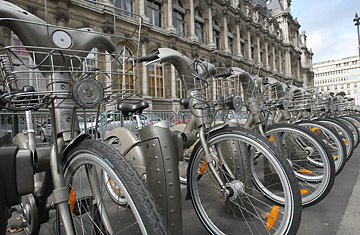
A new bicycle rental service, called Velib', a combination of the words 'velo' (bike) and 'liberte' (liberty), is an initiative pushed by Paris mayor, who has made fighting traffic and pollution his No. 1 goal.
The mayor of Paris, Bertrand Delanoe, might have something on Chanel and Louis Vuitton when it comes to the latest must-have accessory in the French capital. Last July the city introduced a popular new bike rental program called Velib' (a slang combination of the French words velo, for bike, and liberte, for liberty). The bikes, which are available from over 1,421 stations around the city, can be rented on a half-hourly basis (1 euro for the first half hour and 2 euros for the second half hour) or subscribers can pay 29 euros for an entire year of bike riding. Riders can pick up the bike at one station and return it to any of the other stations scattered approximately 300 meters apart around the city. This system, along with the tariff, is meant to encourage riders to use the bikes as they would a car or public transport. The ultimate goal, of course, is to reduce traffic and pollution in the city. But the mayor has also said that he likes the idea of Parisians and tourists alike enjoying the city by bicycle.
The bike program — which started in Lyon — has become extremely popular with Parisians of all ages. Although riders must be at least 14 years old and 1.50 meters tall, these restrictions have not stopped teenagers from using the bikes to go out at night. "You can ride them home after a party, when the metro is closed," explained Agathe Deschamps, 14, who uses Velib' to get to school sometimes. In fact the Velib' is so popular, enthusiasts often have to visit two or three stations before finding a free bike. At a recent dinner party, one guest excused herself for arriving so late because she couldn't find a free Velib'.
Although helmets are not required by French law, they are strongly recommended and rules of the road are spelled out on the Velib' website (www.en.velib.paris.fr). An increase in bicycle-related accidents has been inevitable despite the addition of some 371 kilometers of bike paths in the city. And some riders complain that the pearl gray bikes, which feature baskets and rear lights that turn on automatically when the bike moves, do not have rear-view mirrors. One frequent Velib' user suggested this might be a big opportunity for eyewear manufacturers. After all, the city plans to have over 20,600 bikes circulating by December. Note to Chanel and Vuitton: get the bike accessories onto the market, fast.